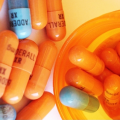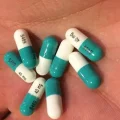Adderall is a combination drug containing four salts of amphetamine. The mixture is composed of equal parts racemic amphetamine and dextroamphetamine, which produces a ratio between dextroamphetamine and levoamphetamine, the two enantiomers of amphetamine.
For people diagnosed with attention-deficit hyperactivity disorder (ADHD), Adderall helps to improve concentration and focus. As a central nervous system stimulant, it can also have the very same effects on people without ADHD.
The symptoms of attention deficit hyperactivity disorder (ADHD) can be categorized into 2 types of behavioral problems: inattentiveness, and hyperactivity and impulsiveness.
Most people with ADHD have problems that fall into both these categories, but this is not always the case.
For example, some people with the condition may have problems with inattentiveness, but not with hyperactivity or impulsiveness.
This form of ADHD is also known as attention deficit disorder (ADD). ADD can sometimes go unnoticed because the symptoms may be less obvious.
Symptoms in children and teenagers
The symptoms of ADHD in children and teenagers are well defined, and they’re usually noticeable before the age of 6. They occur in more than 1 situation, such as at home and at school.
Inattentiveness
The main signs of inattentiveness are:
- having a short attention span and being easily distracted
- making careless mistakes – for example, in schoolwork
- appearing forgetful or losing things
- being unable to stick to tasks that are tedious or time-consuming
- appearing to be unable to listen to or carry out instructions
- constantly changing activity or task
- having difficulty organizing tasks.
Hyperactivity and impulsiveness
The main signs of hyperactivity and impulsiveness are:
- being unable to sit still, especially in calm or quiet surroundings
- constantly fidgeting
- being unable to concentrate on tasks
- excessive physical movement
- excessive talking
- being unable to wait their turn
- acting without thinking
- interrupting conversations
- little or no sense of danger
These symptoms can cause significant problems in a child’s life, such as underachievement at school, poor social interaction with other children and adults, and problems with discipline.
Related conditions in children and teenagers with ADHD
Although not always the case, some children may also have signs of other problems or conditions alongside ADHD, such as:
- anxiety disorder – which causes your child to worry and be nervous much of the time; it may also cause physical symptoms, such as a rapid heartbeat, sweating and dizziness
- oppositional defiant disorder (ODD) – this is defined by negative and disruptive behavior, particularly towards authority figures, such as parents and teachers
- conduct disorder – this often involves a tendency towards highly antisocial behavior, such as stealing, fighting, vandalism and harming people or animals
- depression
- sleep problems – finding it difficult to get to sleep at night, and having irregular sleeping patterns
- autistic spectrum disorder (ASD) – this affects social interaction, communication, interests and behavior
- epilepsy – a condition that affects the brain and causes repeated fits or seizures
- Tourette’s syndrome – a condition of the nervous system, characterized by a combination of involuntary noises and movements (tics)
- learning difficulties – such as dyslexia.
Symptoms in adults
In adults, the symptoms of ADHD are more difficult to define. This is largely due to a lack of research into adults with ADHD.
As ADHD is a developmental disorder, it’s believed it cannot develop in adults without it first appearing during childhood.
But it’s known that symptoms of ADHD often persist from childhood into a person’s teenage years and then adulthood.
Any additional problems or conditions experienced by children with ADHD, such as depression or dyslexia, may also continue into adulthood.
By the age of 25, an estimated 15% of people diagnosed with ADHD as children still have a full range of symptoms, and 65% still have some symptoms that affect their daily lives.
The symptoms in children and teenagers are sometimes also applied to adults with possible ADHD.
But some specialists say the way in which inattentiveness, hyperactivity and impulsiveness affect adults can be very different from the way they affect children.
For example, hyperactivity tends to decrease in adults, while inattentiveness tends to get worse as the pressures of adult life increase.
Adult symptoms of ADHD also tend to be far more subtle than childhood symptoms.
Some specialists have suggested the following as a list of symptoms associated with ADHD in adults:
- carelessness and lack of attention to detail
- continually starting new tasks before finishing old ones
- poor organizational skills
- inability to focus or prioritize
- continually losing or misplacing things
- forgetfulness
- restlessness and edginess
- difficulty keeping quiet, and speaking out of turn
- blurting out responses and often interrupting others
- mood swings, irritability and a quick temper
- inability to deal with stress
- extreme impatience
- taking risks in activities, often with little or no regard for personal safety or the safety of others – for example, driving dangerously.
How to Get An Adderall Prescription
In order to get prescribed Adderall, you must meet with a doctor in person who will diagnose your condition before prescribing Adderall for you, this is the easiest way to get prescribed Adderall because the drug is classified as a Schedule II controlled substance. It is therefore considered to have a significant risk for abuse and the development of physical dependence.
Being in possession of Adderall without a prescription can result in a criminal fine, and/or a jail sentence of less than one year. For instance, a misdemeanor conviction might result in a fine of $500 and 6 months in jail, depending on the substance and amount possessed.
Felony possession charges will result in higher criminal fines, and a sentence in prison (not jail) of more than one year. For example, a felony conviction might result in a fine of $10,000 and a prison sentence of five years. Felony convictions can also result in a loss of certain rights, such as the loss of the right to possess a firearm.
Each state has different controlled substance penalties. California has some of the lightest penalties, while states such as Washington might impose more strict penalties.
What doctors look for when prescribing Adderall?
Generally, doctors look for signs and symptoms of Attention-deficit/hyperactivity disorder (ADHD) which is now recognized in most countries although diagnostic practices differ. Only licensed physicians can prescribe Adderall for you.
What Should I Discuss With My Healthcare Provider Before Taking Adderall?
- Symptoms of your condition that bother you the most
- If you have thoughts of suicide or harming yourself
- If you experience side effects from your medications, discuss them with your provider. Some side effects pass with time, but others may require changes in the medication.
- Any other psychiatric or medical problems you have, including heart disease
- All other medications you are currently taking (including over the counter products, herbal and nutritional supplements) and any medication allergies you have
- Other non-medication treatment you are receiving, such as talk therapy or substance abuse treatment. Your provider can explain how these different treatments work with the medication.
- If you are pregnant, plan to become pregnant, or are breast-feeding
- If you drink alcohol or use drugs
How Should I Take Adderall?
Stimulants are usually taken 1 to 2 times per day with or without food.
- Tablets (Adderall®): Swallow the tablets whole. Chewing the tablets gives an unpleasant taste and can irritate the mouth and throat.
- Sprinkle capsules (Adderall XR®): Swallow whole or sprinkle onto food, such as applesauce or pudding and eat immediately. Do not chew sprinkle capsules or contents.
The dose of stimulant medication is variable. Only your healthcare provider can determine the correct dose for you.
What Happens If I Miss A Dose Of Adderall?
If you miss a dose of stimulant, take it as soon as you remember if it is still early in the day. Do not take a missed dose after 5:00 PM, as this may interfere with sleep. Do not take a missed dose of extended-release capsules after 2:00 PM, as this may interfere with sleep. Discuss missed doses with your healthcare provider. Do not double your next dose or take more than what is prescribed. Read: How Long Does Adderall Stay in Your System
What Should I Avoid While Taking Adderall?
Avoid drinking alcohol or using illegal drugs while you are taking this medication. They may decrease the benefits (e.g., worsen your condition) and increase adverse effects (e.g., sedation) of the medication.
What Happens If I Overdose With Adderall?
If an Adderall overdose occurs call your doctor or 911. You may need urgent medical care. You may also contact the poison control center at 1-800-222-1222.
A specific treatment to reverse the effects of stimulants does not exist.
What Are Possible Side Effects Of Adderall?
Common side effects
- Upset stomach and diarrhea, loss of appetite, insomnia, and mild anxiety.
Rare side Effects
Contact your healthcare provider if any of the following occur while taking stimulants:
- Significant increases in blood pressure or heart rate, shortness of breath, fatigue
- Severe anxiety, panic attacks, mania, hallucinations, paranoia or delusions
- Severe muscle pain, weakness, signs of dehydration, or dark urine
- Prolonged or painful erection
- Changes of feeling or color in your fingers or toes.
Serious side effects
Misuse of amphetamine medications may cause sudden death and serious cardiovascular adverse events. Amphetamine medications should be avoided in individuals who have a heart defect (structural abnormality), uncontrolled high blood pressure, or other disorder of the heart.
Are There Any Risks For Taking Adderall?
Stimulants are Schedule II controlled substances. There is a risk of physical and/or emotional dependence (addiction) when they are taken for long periods of time.
Although treatment with stimulant medications can slow growth, many studies have shown that these changes are small. Children may catch up with growth over time; therefore, it should not be a concern for most children. Height, weight, and eating habits should be discussed before treatment starts and regularly during treatment. If you are concerned about your child’s growth, discuss other possible treatments with your child’s doctor.
What Other Medications May Interact With Adderall?
Medications used to treat depression can interact with amphetamine medications resulting in serious reactions including high body temperature, high blood pressure, and seizures (convulsions). Tell your healthcare provider if you are beginning or have recently discontinued any of these medications.
Stimulants should not be taken with or within 2 weeks of monoamine oxidase inhibitor antidepressants (MAOIs), including phenelzine (Nardil®), Tranylcypromine (Parnate®), selegiline (Emsam®), and isocarboxazid (Marplan®) or the antibiotic linezolid (Zyvox®). Taking stimulants with or within 2 weeks of MAOIs can result in seizures, fever or dangerously high blood pressure that can lead to death.
The following medications may increase the levels and/or effects of stimulant medications:
- Increase levels: Antacids (e.g., sodium bicarbonate, calcium carbonate [Tums®]), acetazolamide
- Increase side effects: Atomoxetine (Strattera®), caffeine, phenylephrine, fluoxetine (Prozac®), bupropion (Wellbutrin®), venlafaxine (Effexor®), duloxetine (Cymbalta®), Modafinil (Provigil®), and armodafinil (Nuvigil®)
The following foods/medications may decrease the levels and effects of stimulant medications: ascorbic acid (vitamin C), acidic beverages (e.g., orange juice, grapefruit juice)
Stimulant medications may decrease the effects of blood pressure medications.
How Long Does It Take For Adderall To Work?
Although you may experience beneficial effects from stimulants within a few days of starting the medication, it often takes several weeks to get the full effect of the medication. Your healthcare provider may also need to gradually adjust the dose to find the dose that works best for you.
Summary Of FDA Black Box Warnings
Sudden Cardiac Death: Misuse of amphetamines may cause sudden death or serious cardiovascular adverse events.
Dependence: Amphetamines have a high potential for abuse. Prolonged use of amphetamines may lead to drug dependence. Particular attention should be paid to the possibility of subjects obtaining amphetamines for non-therapeutic use or distribution to others. They should be prescribed or dispensed sparingly.






